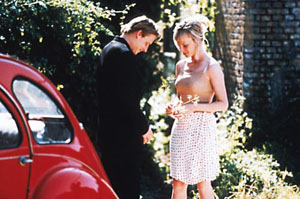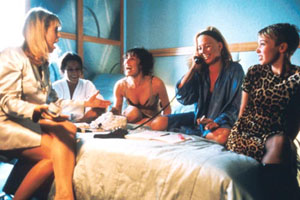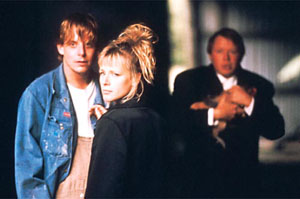|
| MIFUNE
- The Way of the Samurai? |
magyarul |
Why see a Danish
movie called “Mifune”? How could you not? Most people who have done
so have probably gone because the film’s reputation as “Dogma III”
preceded it.
Much of the criticism it has received  has
surrounded the fact that it was shot on 35mm film (unlike “Festen”
and “Idiots” which came before it), and is ostensibly far more ’accessible’
than the other Dogma offerings were. Without getting too involved
in the Dogma aspect of the film, as far as I can tell nothing in
the manifesto prohibits shooting on film instead of video, and “accessible”
has always struck me as a snob’s euphemism for “enjoyable.” has
surrounded the fact that it was shot on 35mm film (unlike “Festen”
and “Idiots” which came before it), and is ostensibly far more ’accessible’
than the other Dogma offerings were. Without getting too involved
in the Dogma aspect of the film, as far as I can tell nothing in
the manifesto prohibits shooting on film instead of video, and “accessible”
has always struck me as a snob’s euphemism for “enjoyable.”
Certainly that seems to be the case here, though personally I would
take exception to the idea that “Mifune” is truly less challenging
than, for example, “Festen” (a.k.a. “Celebration”).
There is, in fact, considerable similarity
in the themes of the two projects, above all that of a lone protagonist
awkwardly attempting to maintain composure while struggling with
an increasingly unwieldy breakdown in his already dysfunctional
family. What opens “Mifune” up to the charge of (gasp) accessibility
is that the later film attempts to do so with a rather more generous
dollop of humour than the earlier one did. What Soren Kragh-Jacobsen’s
“Mifune” (or “Mifune’s Last Song,” as it was titled in certain languages)
undoubtedly shares with Lars von Trier and Thomas Vinterberg’s earlier
Dogma efforts is exceptionally good performances by virtually all
members of its cast. More than one  critic
has taken to asking whether Denmark really has this apparently unlimited
supply of fantastic, unknown (to the rest of us) actors, or whether
Dogma is just an elaborate conspiracy to make us think so. Certainly
one shudders to think what horrendous results would ensue if someone
came up with the idea to make a series of such ’warts-and-all’ films
in, say, Hungary. critic
has taken to asking whether Denmark really has this apparently unlimited
supply of fantastic, unknown (to the rest of us) actors, or whether
Dogma is just an elaborate conspiracy to make us think so. Certainly
one shudders to think what horrendous results would ensue if someone
came up with the idea to make a series of such ’warts-and-all’ films
in, say, Hungary.
But enough about Dogma. In case you were
wondering, “Mifune” refers to the Japanese
actor Toshiro Mifune, who played a peasant masquerading as a samurai
in Kurasawa’s “The Seven Samurai” (and
the subject of a childhood game to the brothers in the film, in
case you were also wondering how anyone’s supposed to make that
connection).
It is the story of Kresten, an egotistical,
upwardly-mobile Danish yuppie, who at the outset of the film is
in the process of cementing his promising future by marrying the
boss’ daughter. When the call comes that his father has died, he
finds himself in the awkward position of having to admit to his
shiny new bride that, instead of being the orphan he’d always claimed
to be, he was son to a poor farmer from nowheresville, as well as
younger brother to a mentally handicapped middle-aged man whom he’d
now have to find care for.
With that, Kresten heads back to the sticks
and, “Rain Man”-style, tries to figure out how he can get his brother
- Rud - taken care of without unduly inconveniencing himself. When
he gets back to the ramshackle family farm and tries to sort things
out with Rud, Kresten begins to experience pangs of guilt about
having his brother committed to an institution for the retarded
and letting the homestead go.
He gets the idea to hire a housekeeper to look after both Rud and
the farm, thinking he can head back to Copenhagen when calm has
been restored. His newspaper ad for this position is answered by
a call girl named Liva,
looking for an  out-of-the-way
place to lay low from her pimp and an increasingly threatening stalker
(she doesn’t mention this in her application). Kresten is immediately
taken by this beautiful and mysterious stranger, having expected
an aging matron, and Rud is likewise immediately convinced that
Liva is actually ’Linda,’ a comic-book heroine whose exploits he’s
been following for decades, appearing on the farm to make things
right. His attempts to ’signal’ Linda with the comic character’s
signature open-palms, hands-to-the sky gesture makes for a truly
inspired running gag in the film. Various problems ensue, including
run-ins with sadistic neighbours, Kresten’s soon-to-be-ex-wife,
Liva’s problem-child little brother and a posse of overly-protective
former fellow-prostitutes. out-of-the-way
place to lay low from her pimp and an increasingly threatening stalker
(she doesn’t mention this in her application). Kresten is immediately
taken by this beautiful and mysterious stranger, having expected
an aging matron, and Rud is likewise immediately convinced that
Liva is actually ’Linda,’ a comic-book heroine whose exploits he’s
been following for decades, appearing on the farm to make things
right. His attempts to ’signal’ Linda with the comic character’s
signature open-palms, hands-to-the sky gesture makes for a truly
inspired running gag in the film. Various problems ensue, including
run-ins with sadistic neighbours, Kresten’s soon-to-be-ex-wife,
Liva’s problem-child little brother and a posse of overly-protective
former fellow-prostitutes.
Contrived
as this all may sound,
Kragh-Jacobsen’s film somehow manges to feel unhurried, as well
as to ring true far more often than it rings false. Those who have
seen Iben Hjejle’s
bloodless
’star turn’ as the female lead in Stephen Frears’ hit “High
Fidelity” will, I suspect, be amazed by her electric performance
as Liva. Anders W. Berthelsen is flawless in the role of Kresten,
and in fact it is his work which permeates and carries the film.
Jesper Asholt’s Rud has been the subject of controversy and wildly
varying reviews, but in my view this has more to do with the as-yet-unexplained
preponderance of mentally slow characters in Dogma films (including
the lone non-Danish Dogma-certified project to date, Harmony Korine’s
"julien donkey-boy"), rather than the virtues or faults of his work
here. To my mind, Asholt’s performance is strong, while Emil Tarding as Liva’s brother Bjarke is no less than excellent
in a difficult role for such a young actor. There are, inevitably,
weak points in the story: the “visit” of Liva’s prostitute ’friends’
is plain silly, her reaction to Kersten’s rough seduction is uncharacteristically
extreme, and the ’evil’ neighbour seems to be more than a little
out of place in rural Denmark, especially when he pulls into the
farmyard for an attempt to sample Liva’s sexual wares in his sparkling
new Ford station-wagon.
while Emil Tarding as Liva’s brother Bjarke is no less than excellent
in a difficult role for such a young actor. There are, inevitably,
weak points in the story: the “visit” of Liva’s prostitute ’friends’
is plain silly, her reaction to Kersten’s rough seduction is uncharacteristically
extreme, and the ’evil’ neighbour seems to be more than a little
out of place in rural Denmark, especially when he pulls into the
farmyard for an attempt to sample Liva’s sexual wares in his sparkling
new Ford station-wagon.
The “Hollywood”
ending
(which I won’t give away, although it’s exactly what one would expect
from an ending saddled with such a moniker) has been the source
of much derision from “serious film”-types, and I must confess it
came as a disappointment to me as well, though not because of any
’Hollywood’ or ’anti-Hollywood’ choices on Kragh-Jacobsen’s part,
but rather because it didn’t fulfill the promise of all the distinctly
non-storybook situations which led up to it. Nonetheless, the journey
was more than worthwhile, and “Mifune,” for me, not only goes further
than the other two Danish Dogma efforts in satisfying the manifesto’s
objective to “force the truth out of ... characters and settings,”
but it does so with an intoxicating cocktail of humour, humanity,
harshness and charm.
-dylan
gray-
|